LONDON -- 3 p.m. local time
I apologize for note posting more. the travel schedule has been a bit hectic and TV requirements necessarily kept me away from the blog.
So much has been said about Obama's speech. I wanted to offer a slightly different angle than I've heard so far and throw it out for debate.
Obama spoke of the rich and courageous history of Berlin. As he did so, he may have helped educate a generation largely raised without a living memory of the Cold War or, at best, a dim memory of what it was, a sense of how long the struggle lasted and what the victory meant.
It's an important lesson, one I fear may have been lost on many in a crowd so obviously taken with Obama's personal charisma and political acumen. By the looks of the crowd and by the analysis of many German reporters who were there, I think it's fair to say most who came to see Obama would identify themselves as liberals or social progressives. The loud applause for Obama's line about ridding the world of nuclear weapons seems at least partial confirmation.
A generation ago, I suspect, many of the Europeans we came to see Obama yesterday would have either passionately or at least notionally identified themselves with the massive protest movement against NATO's decision in 1983 to deploy Pershing II and Cruise missiles in Germany and England. This move, originally contemplated in the late 1970s, was NATO's response to Soviet deployment of intermediate range SS-20 missiles, nuclear weapons capable of hitting every major capital in Europe.
The debate in Europe spawned anti-nuke protests in the U.S. and in many quarters on the American and European Left the deployments appeared to be both risky and provactive. Those who most aggressively pushed for them Gemrman Chancellor Helmut Kohl, British Prime Minister Magaret Thatcher and President Reagan saw the deployments in exactly the opposite light. The NATO deployments, Reagan, Thatcher and Kohl believed, were an essential signal to the Soviets that the West would not be intimidated and that despite public misgivings, NATO could summon the grit to call the Soviet bluff.
NATO deployed the Pershing II and Cruise missiles to force the Soviets back to the negotiating table on nuclear arms reductions. The strategy worked and in 1987 the U.S. and the Soviet Union signed the Intermediate-range Nuclear Forces treaty in 1987.
Reagan's now famous Brandenburg Gate speech summarizes this struggle and the beginnings of a thaw in Soviet behavior under Mikhail Gorbachev. Viewed now, it seems inconceivable that Reagan could have given the speech and its memorable lines -- Mister Gorbachev, open this Gate! Mr. Gorbachev, tear down this wall!" -- without the NATO deployment of the Pershings and Cruise missiles.
For those interested, here is a link to Reagan's speech: http://www.reaganlibrary.com/reagan/speeches/wall.asp
I've also included a quick bit of history on the "ban-the-bomb" movement: http://www.cnn.com/SPECIALS/cold.war/experience/the.bomb/opposition/
Here is also a bit of official history of the Pershing Missile:
http://www.coldwar.org/articles/50s/pershing_missiles.asp
I don't know what Obama thought about the Pershing and Cruise missile deployments or his overall attitude toward this "hard power" move by NATO to confront the Soviets and increase the risks of nuclear confrontation as a bid to increase the West's negotiating power in arms-reduction talks.
The RNC is currently fascinated with the subject, peppering reporters' e-mail boxes with posts about a "missing" Obama thesis on U.S.-Soviet disarmament while at Columbia University. The university and Obama's campaign say the thesis can't be found.
The thesis, it seems, is less important than what Obama says here and now. Indeed, one of the reasons parts of Obama's speech fell flat yesterday was that he confronted his adoring hordes with demands to spend more in terms of money and troops to win the war in Afghanistan, a NATO-led effort the senator said, sounding very much like one who understands "hard power" the alliance can't afford to lose.
The crowd, and you can detect this from watching the speech, did not rise up in applause. Instead, it sat passively, almost inert. That was also the response to Obama's call for more aggressive European cooperation in dealing with Iran's pursuit of nuclear weapons. Europeans adore Obama's willingness to negotiate directly with Iran. But Obama warned them that should he win the presidency and those negotiations fail, Europe must be willing to impose far tougher economic sanctions than have heretofore been contemplated.
Obama could not be more specific than he was on these two issues because he's not the president. But he pointed a general direction that left his vast and impressive audience cold, at least on the questions Obama has clearly identified as the most important to the future of the war on terror -- how does the West win in Afghanistan and how does it keep nuclear weapons out of the hands of the Iranian regime.
This does not diminish the weight or importance of Obama's speech. To the contrary, it may make it all the more important. For all the impressive pictures of fawning multitudes at his feet, Obama must confront the possibility, should he be elected, that he could find himself in open conflict with the European Left.
This would make Obama true heir, not just a rhetorical one as he was yesterday, to Reagan's leadership on the world stage in a time of testing. But unlike Reagan, Obama owes his rise in American politics to the support of liberals who, in the main, opposed Reagan and joined the European Left in opposing his hard-line approach throughout the Cold War.
What Obama's speech yesterday may have laid the foundation for, then, is a potential clash first with his most ardent supporters as he, if president, mush simultaneously confront the Taliban and Iran. And that may prove an even more formidable political challenge than Reagan faced. A true test of the tinsel strength of the politics of "hope."




